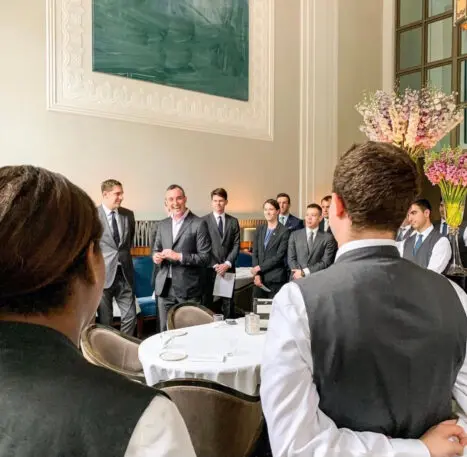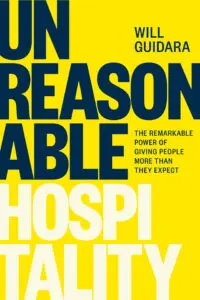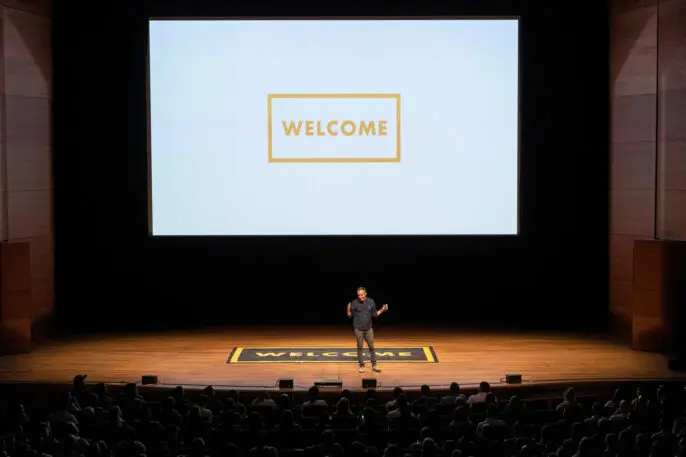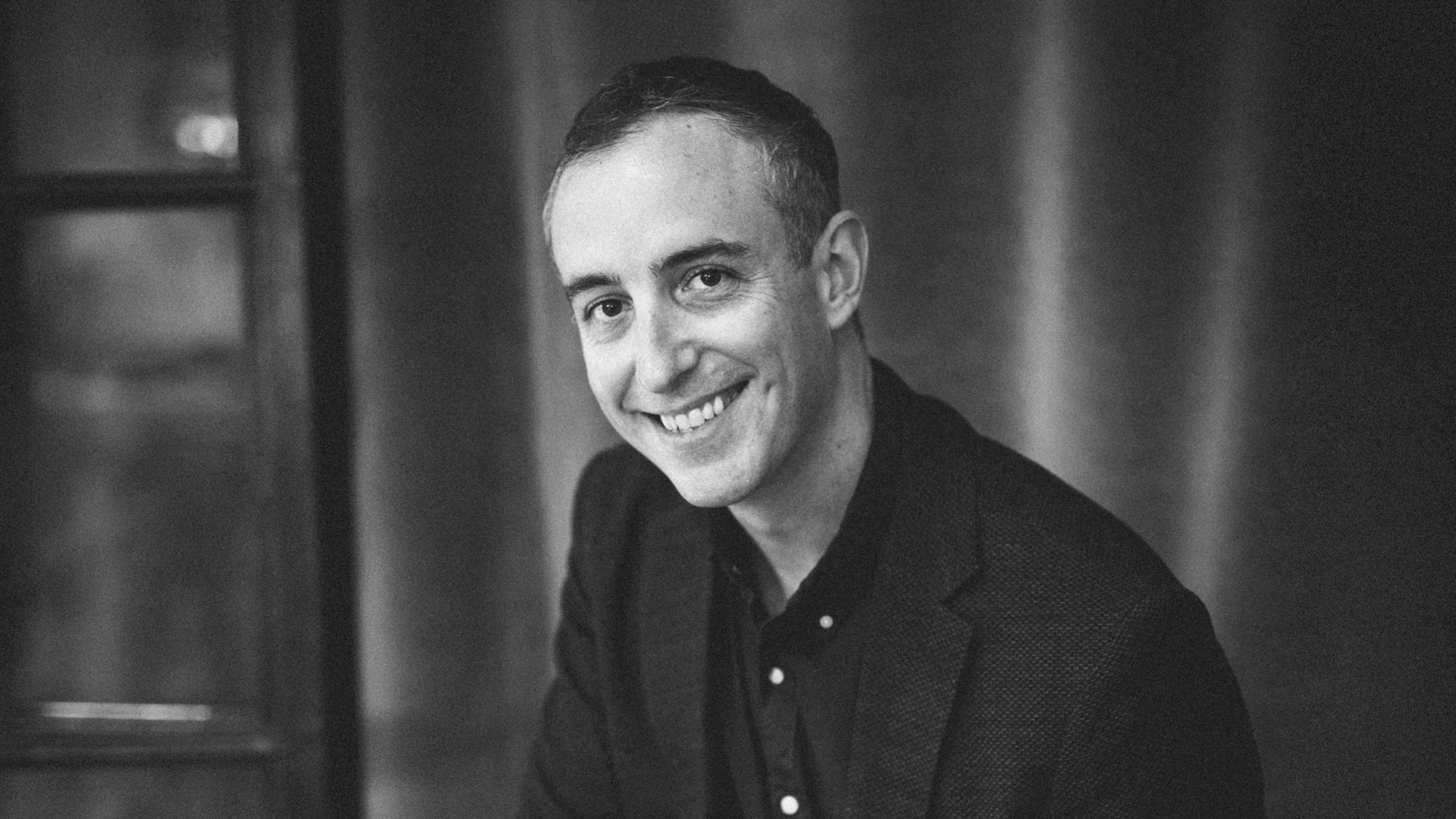“I spent so many years running a restaurant trying to learn from other industries,” says Will Guidara, who as general manager and then co-owner of New York’s Eleven Madison Park transformed it from a good brasserie into the world’s No. 1 dining destination. “Especially in this moment, it feels especially relevant for other industries to start learning from restaurants.”
In his new book, Unreasonable Hospitality: The Remarkable Power of Giving People More Than They Expect, Guidara embeds ideas and insights for how to do this in the compelling narrative of his pursuit of not just excellence but of a generational shift in what it means to be cared for during an evening out. For the diner, it was a magic trick when the same person who had called them two days earlier to confirm their reservation would be there to greet them at the door as they entered and recognized them on sight. It was the best kind of witchcraft when the server would drop off a complimentary bottle of cognac with the check, changing the most stressful moment of the evening into one of the most delightful. (To say nothing of the actual tableside magic trick Guidara wove into the meal at one point.)

Guidara’s book arrives at a fortuitous moment. The aftereffects of the pandemic combined with economic uncertainty appear to have provoked a deterioration in how customers behave at the precise time that service-based businesses, in particular, are struggling with the return in demand and a shortage of workers. It’s a vicious cycle, but one that can be made virtuous. I sat down with Guidara at an exemplary all-day café to discuss how businesses can adapt the mindset that put him at the pinnacle of his profession and that could forever change how companies think about their customers.
Fast Company: How do you define unreasonable hospitality?
Will Guidara: Anyone who’s done anything that has changed the game, anything that’s been reasonably innovative, has been unreasonable and relentless in the way that they pursued the product they made. Unreasonable hospitality is taking that same spirit and applying it to the way it makes the person who’s being served feel and honestly every other stakeholder that it touches along the way. A lot of people have never actually taken the time to think about that facet of their business and the extraordinary impact that can have, not just in growing the business in a positive direction but the way in which it enhances the experience of whatever you do.
In 2004, the restaurateur Danny Meyer (Gramercy Tavern, Shake Shack), whom you worked for at the time, published Setting the Table, which had a similar spirit to Unreasonable Hospitality of how do we bring the hospitality that is the bedrock of the restaurant business and take it outside this world and scale it. What do you feel like you’re adding to the conversation?
My entire approach to service and hospitality has been built upon the foundation that Danny gave me. The same is true for the book. This book wouldn’t exist in its current form were it not for Setting the Table. What Danny did was brilliant. In addition to the tenets of enlightened hospitality, just the idea of take care of your people first. That’s now so well understood and embraced, but it was very novel when it was first introduced. He defined what hospitality could be.
What I tried to do at Eleven Madison Park was take that and approach it in a completely unreasonable way. What does it look like if you take that idea and sprint with it? When our food was as good as it could be in the world, when our service was as close to technically perfect as possible, when our room was one of the most beautiful, it wasn’t any of those things that actually got us to the top. It was taking that same relentless approach and applying it to hospitality.

One of your maxims is “adversity is a terrible thing to waste.” Have we wasted the pandemic in terms of customer experience? I did appreciate the creativity and experimentation of things like Canlis [the iconic, 70-year-old Seattle fine dining restaurant, which adapted quickly with to-go concepts], but in terms of really seeking to figure out how to take care of customers, there was a lot that did not happen or worse.
People were craving to get back to normal, and there could have been an opportunity to define what a new normal could be. You mention Canlis. One of the touchstones of unreasonable hospitality is take what you do seriously, but don’t take yourself too seriously. Far too often, as individuals and as customer service companies, we let self-imposed standards stand in the way of us giving people what they actually want.
During COVID, this storied fine dining institution became a bingo hall and a drive-in movie theater. They’re more beloved and embraced by the entire city and, honestly, the world than they ever were before. Because they stopped caring about how to articulate the brand perfectly and they just care about how to bring joy.
You’ve been doing some consulting and you have the Welcome Conference, which attracts a broader purview of folks than just restaurant people. How do you advise non-restaurant people to think about unreasonable hospitality?
It starts with simple pattern recognition. If you look closely enough at your business and take two hours around a table, just ask yourself, “What do we do? What are the recurring moments that happen, and how can we address them in a more thoughtful, unreasonable way to leave everyone involved in the transaction feeling better on the other side of it?”
I’ll give you an example that just happened to me last night. In the book, I talked about real estate agents. You get a bottle of sparkling wine when you move into a new apartment. Then I ended up randomly working with I think the best real estate agent on Earth, the guy who I’ve been working with as [my family has] been selling one place and moving to another place. We moved to our new apartment yesterday.
When you move, it’s a very chaotic, overwhelming experience, right? You’re trying to settle into a new home. You pack up all your books and your clothes. But it’s pretty well understood that you’re not, like, packing up your entire refrigerator and bringing it with you. Yesterday at 3 o’clock the buzzer rings, and someone brings us two bags of groceries. Just the staples. And that was a gift from a real estate agent.
It’s pattern recognition. What do people actually need when they move into a new house? You don’t need a random bottle of sparkling wine that shows no care or consideration. They’re probably really hungry and scrambling and trying to settle into their new home. Will has a book coming out next week. He’s probably totally overwhelmed. Just give them some food, proper nourishment. That’s beautiful. Simple pattern recognition that’s not a one-size-fits-one gesture of hospitality. He could do that with everyone. But already that’s a much more profound display of graciousness and thoughtfulness. These opportunities exist everywhere.

One of my favorite things in the book is the story of how you pull off being able to remove the host podium from customer view and greeting people by name when they come in, taking advantage of Google to image search guests. There’s been no shortage of tech tools to facilitate the customer experience. What role do you think technology has to play in unreasonable hospitality?
I used to think that technology was the enemy of hospitality. Then I came to realize it’s not technology, it’s how it’s used. I’ll give an example. For a long time, we would block all of our reservations online so you had to call the restaurant, because I wanted a human voice to be the beginning of the experience. The backend technology was very helpful to us, but I didn’t want anyone to be able to book with us.
Then Uber came around, and there was a season with Uber, like a year and a half after it started, when the drivers showed up in front of your building, wherever you were, they would call you right away to say, “I’m here.” It was the most annoying thing in the world. Because of the technology, I know you’re here. You’re calling me right as I’m trying to say goodbye to whoever I’m with.
That was my wait a minute. Maybe talking to people isn’t always hospitality. That was me forcing what I wanted the experience to be onto my guests. They were calling; they were being put on hold for 30 minutes, only to talk to someone who said we’re full up. What hospitality actually looked like was going entirely online. People can just go figure out, is there a reservation or not? The whole calendar’s right there. It’s not this whole back and forth.
This is where technology really enhanced hospitality. Because we didn’t have people saying “I’ll put you on the waitlist,” now those same human beings, rather than spending four hours every morning saying no, could call the people who were coming in and say, “Hey, is there anything special we can do for you, anything at all?” And they can actually be getting information from people on how we can make their experiences better.
It seems like customer behavior has gotten worse, and a lot of employers are also treating their workers worse, or at least with less care for what they’re experiencing in this moment. How would you address those challenges?
How you manage the team is a big big part of this, right? There’s no way your team is going to go out there and give unreasonable hospitality if they’re not on the receiving end of it as well. You can’t have one without the other. On the customer side, there’s no space for abusive customers. When someone crosses the line, they have to go.
Hospitality is about relationships, and relationships are a two-way street. There are always going to be a few customers who just don’t have a place in your orbit, but it’s pretty remarkable to me how if you lead with graciousness, you end up with so few bad customers because they give back what they receive.
You could say, “Yeah, but they’re mean, so why should you be nice to them?” Like, well, hold on, maybe they’re mean because no one’s being nice to them, which oftentimes is the case. We can all retreat into our corners because there’s bad energy out there, but the people who lead with great energy oftentimes receive the most good energy back. I don’t subscribe to the idea that just because customer behavior isn’t the best it’s ever been that we should retreat into our corners. People have been consumed with anxiety, fear, and uncertainty, and actually that’s when people need hospitality more than ever before.
Lightning round. How would you apply unreasonable hospitality to these industries or experiences. Let’s start with curbside pickup.
I actually have had unreasonable hospitality with curbside pickup, where I’ve gotten a text five minutes before I’m supposed to be there, saying we’re gonna be out there at this time. Or I get the text 30 minutes before: Hey, this thing you ordered, we don’t have it, but we have this, this, or this. They understand what I’m trying to get out the experience.
How about delivery apps?
There are restaurants where I’m a bigger regular through the delivery apps than I’ve ever been at a restaurant in real life. Every time I go to a restaurant where I am a regular, they’ll do something to acknowledge me. [During our breakfast, the kitchen sent out a complimentary plate of pears with pistachio, mint, and honey.] The fact that that’s never happened to me once through a delivery app is bonkers to me. There’s no acknowledgement of me being a regular. No “Hey Will, so good to have you back. I noticed you always ordered these three things. Here’s something else you might enjoy.” Or “Hey, thank you for your 50th order. Here’s something to put in the fridge to have tomorrow.”
This is me being cheeky, but what about an experiential dessert restaurant moving into consumer-packaged goods? [Guidara is married to Milk Bar founder Christina Tosi.] We can do Carbone if you want, same notion.
Objects can’t be hospitable. It’s the people behind them that can be. The fact that I can have Carbone sauce at home, or can crush a pint of peanut butter crush ice cream by Milk Bar, that just made my life a little bit better. If you say it’s gonna be good, make sure it’s good.
What about grocery stores?
At Pret a Manger they had this thing where anyone in the company, any of the cashiers, could comp someone’s meal if they wanted to. Give the cashiers agency. I talked about acknowledging regulars through delivery. Acknowledge regulars at a grocery store. “So good to see you again. Here, this is on the house.”
By the way, how could Carbone and the grocery store work together to be hospitable? Carbone could call Stop and Shop and say, “I’m gonna send you five cases of free sauce and tell the cashiers that if there’s anyone that they just think is awesome to give them one for free. Just as a way to say thank you for coming to Stop and Shop. And by the way, it’s amazing marketing for ourselves.”
It does seem like there is a lack of creativity and feeling like, well, we’re the grocery store, what are we supposed to do?
The moment Sarah, who’s the cashier, gets to hand you that jar and gets to be the one who decides You, who I see once a week, I want to give you something, and sees the look on your face when you receive it, she is going to immediately be better at her job. The answer to every single one of these examples is giving the people on the front line more agency, trusting them, empowering them, and giving them some of the resources to do it.
There is a Danny Meyer term, SFN, which means “something for nothing.” If I got an SFN at the Stop and Shop, I’d never go to a different grocery store again! No one ever expects an SFN at the grocery store. So why isn’t someone being the first to do that?
When Setting the Table came out, those ideas were revolutionary, and now they’re the standard. My hope is that in 18 years, what I describe as unreasonable hospitality feels very reasonable. Right now it’s unreasonable because so few people approach these kind of grace notes and relationship building with any spirit of creativity or relentlessness. But if everyone did that all the time, businesses would be better, people would feel good, and the world would be a better place.
Recognize your brand’s excellence by applying to this year’s Brands That Matter Awards before the early-rate deadline, May 3.
